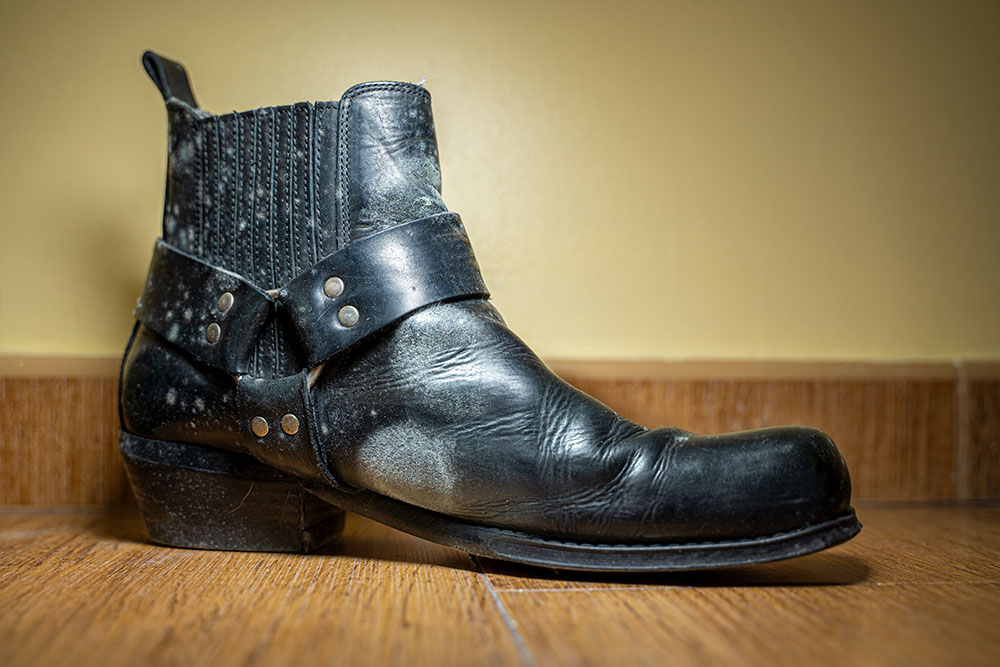How To Prevent Mould In Shoes

CONTENTS
- Understanding mould in shoes
- Types of shoes and their susceptibility to mould
- The role of climate in shoe mould growth
- Preventing mould growth in shoes
- Maintenance practices for mould-free shoes
- Dealing with existing shoe mould
- Frequently asked questions
- Get in touch
When mould grows in your shoes, it ruins the material and might even pose health risks. Shoes of different types and materials are vulnerable to this fungal growth, from trainers to leather boots - and some are more susceptible than others.
At ICE Cleaning, we understand the frustration of tackling mould on your own. We are here to offer our high-quality mould remediation services that are guaranteed to leave your space clean, safe and mould-free.
Read on to learn why mould chooses to grow in our shoes and how different types are more vulnerable than others.
Understanding mould in shoes
Mould can find its way into your shoes due to the damp and dark conditions. This environment is ideal for mould growth and can damage your footwear, posing potential health risks.
According to the NHS, mould exposure can cause sneezing, runny nose or skin rash. In severe cases, it may lead to shortness of breath or asthma attacks. Therefore, eliminating shoe mould is crucial for maintaining good health.
Shoe materials show their vulnerability towards mould infestations, as leather absorbs fluids, and synthetics display a lower permeability limit. However, protecting against mould in your favourite footwear can be conducted with precautions.
Types of shoes and their susceptibility to mould
The material of your shoes can affect their vulnerability to mould. Leather shoes, for example, are targets due to their organic nature and porous surface. They absorb moisture, which makes them an ideal breeding ground for mould spores.
On the other hand, synthetic materials such as plastic or rubber offer less hospitality to mould, because they do not hold onto moisture. However, sweat from your feet might still provide mould a chance.
Fabric-based footwear like canvas trainers can also succumb easily if not dried after getting wet. Closed-toe styles trap heat and humidity compared to open designs like sandals or flip-flops. High-top sneakers also have more dark corners where damp can accumulate.
The role of climate in shoe mould growth
Climate plays a significant part in mould growth on shoes. Damp and humid conditions are particularly favourable for mould, as they provide moisture, which the fungi need to grow. In warmer climates or during summer, sweaty feet can create an ideal environment inside your shoes for mould.
However, cold and damp weather also poses risks because wet footwear does not dry out as quickly. Maintaining mould-free shoes is more challenging in areas with high humidity levels, like coastal regions or rainy cities.
Even if you keep your shoes clean and dry after wearing them, the ambient moisture can still lead to mould formation. To avoid this issue, use silica gel packs or shoe dehumidifiers that absorb excess moisture within the shoe's environment.
Preventing mould growth in shoes
The key is to keep your shoes dry to ensure mould does not gain an advantage. Use a hairdryer or place them near a heater after getting caught in the rain.
You also need to give your shoes some care when you are not wearing them. Storing them correctly helps stop mould growth, and shoe trees made of cedar work well, as they absorb moisture and maintain shoes.
If you store your shoes in a wardrobe or other enclosed space, ensure the storage has good ventilation or place a compact dehumidifier inside.
Maintenance practices for mould-free shoes
Keeping your shoes mould-free starts with regular cleaning. You can use shoe cleaning products that act as anti-bacterial and odour treatment that also helps prevent mould.
Next, ensure they are dry before storing them away. Wet shoes are breeding grounds for mould spores.
Apart from this, proper storage is key in maintaining their condition. Store your footwear in cool and dry places; avoid humid areas like basements or garages, where moisture levels may be high.
If you spot any signs of mould spreading despite these measures, it might be time to seek professional help from a mould cleaning company. We offer specialist cleaning services, including effective solutions for tackling mould problems.
Dealing with existing shoe mould
If you have found mould on your shoes, you must handle this problem quickly and carefully. The first step is to remove the mould-infested shoes safely from your home. You will need gloves and a mask for protection because touching or inhaling mould spores can be harmful.
Take your shoes to a professional dry cleaning company specialising in shoe cleaning and restoration. They will use industrial-style methods to clean the mould from your shoes.
If the mould has spread to places in your home, you must contact a mould removal company to assist you with this issue. Specialists can discover the root cause of the mould and help prevent its return in the future.
Frequently asked questions
How do you get mould out of shoes?
You can have the mould removed by a professional dry cleaner.
Why is mould growing on my shoes?
Mould forms on your footwear due to moisture trapped inside, combined with dark and warm conditions – perfect for fungal growth.
Can I put mouldy shoes in the washing machine?
Do not put any mould-infested fabrics in the washing machine as this can spread to the drum of the machine and infect other clothing.
Why is there green mould on my shoes?
The green mould signals that spores are thriving. It is likely caused by dampness coupled with poor ventilation or storage practices.
Get in touch
With ICE Cleaning's expert mould removal services, you can enjoy a clean, safe and healthy property. Our team uses modern techniques and equipment to eliminate all traces of mould at competitive rates.
Take action today and contact our staff at ICE Cleaning for all your mould cleaning needs. Contact us at 0208 066 0360 or enquiries@icecleaning.co.uk, where we will be available 24/7 to take your call and can even arrive on-site the same day in an emergency.

Speak with me today,
I’m here to help
By asking you a few questions either via phone or email I can immediately provide a realistic estimation of the cost.
You’re in good company. We’ve cleaned for the following commercial clients… View all

Why choose us?
- Cater to a wide variety of cleaning situations
- Nationwide coverage, available 24/7
- Cater to commercial and domestic clients
- Free survey provided prior to quotation
- Emergency response team
- Offer a bespoke service designed to suit all your needs
- All technicians hold professional health and safety qualifications, including BICSc, IOSH, Dewpoint Professional & Safe Contractor
We’re fully accredited
We place best practise, professional expertise and health and safety at the core of our business. We’re fully compliant with all legal obligations. You can view a list of our accreditations below, or visit our Health & Safety page for more information.











-RGB-small.1707319151.jpg)




















